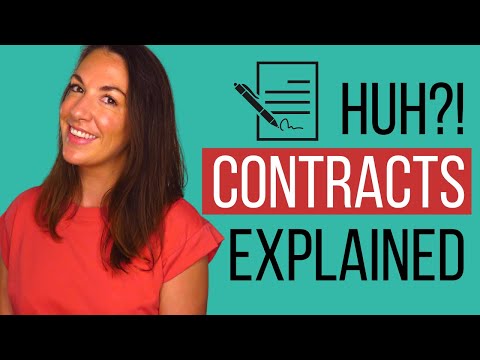Small Business Contracts Basics | Why You NEED Contracts in your Biz

i'm back you guys thought you could get rid of me but you can't i'm back hi there i'm aiden durham business and branding attorney with 180 law co in colorado welcome back to all up in your business today's episode is the first in a little little kind of mini series within all up in your business which i have tentatively called huh that's right huh cause we're gonna be talking about contracts and that's what i often find myself saying when i'm reading reviewing contracts because you know they're kind of confusing sometimes or they're not written well sometimes so i'm often finding myself staring at my computer going huh anyway so this first episode we're going to just talk about like contract basics like what is a contract what actually makes a contract a contract and what does that even mean i'm going to talk a little bit about some things that we typically want to see in contracts and then some kind of overall real common types of contracts that you'll typically want or need in your business and then in future episodes of huh i'm going to talk about i'm sorry i think that's funny i don't know if you guys i think it's funny in future episodes of my huh series i'm going to talk about like what are specific terms of a contract and explain some common boilerplate language that we often see in contract there are three kind of basic elements of a contract there are more there are more than just these three but there are three things that need to exist in order for a contract to be a contract those three things are an offer acceptance and consideration so party a makes an offer to perform a service for party b party b cardi b sounds like cardi b party b accepts that offer but that's not enough we still need consideration kind of simply consideration is what is the party what are the parties giving up in exchange for this agreement often typically the thing we think of as consideration is money party b is paying some money to party a in exchange for services that's the consideration it doesn't always have to be money though sometimes we have contracts where there's no exchange of money involved but each party is still kind of giving something up for example i this comes up a lot in my work with respect to trademarks if we are trying to register a trademark maybe the uspto issues and office action is refusing to register our trademark because of another party that already has a trademark registration that's too similar to ours we think well my client has a better right over this trademark we could try to oppose or get this trademark cancelled but in reality do we really want to go through that fight no we might try to talk to the other party and say hey can we agree to just co-exist in in this space together and in that agreement there is sometimes an exchange of money but often there isn't and it's just okay we are agreeing that um i will operate under this trademark in this way you can operate under your trademark in this way and so the consideration there is that each party's kind of giving up its ability to operate the con the trademark in a different way we're conceding to something anyway consideration something has to be kind of given up in exchange for there to be a contract now without all three of those things offer acceptance consideration there is no contract now what about an agreement what's the difference between a contract and an agreement we i at least use the two terms kind of interchangeably i'm writing an agreement i'm writing a contract but they're not really the same thing an agreement really is just a mutual understanding between the parties between two parties or multiple parties we're just mutually understanding mutually coming to some agreement a contract however is an agreement that creates enforceable legal rights and obligations so we have this agreement but also because this is a contract there is some right or obligation that can be enforced by us or against us that's really ultimately the difference between agreement and contract you might hear me still use the terms interchangeably in this context it's it's not that big of a difference really now we talked we talked about offer acceptance consideration what i didn't say what you may notice was missing was it has to be in writing that's not part of what legally creates a contract there's no legal requirement that something has to be in writing in order for it to be a legal contract except except okay there kind of is there's this uh concept called the statute of frauds which does say that in certain instances a contract must be in writing in order for it to be valid and enforceable that uh is for example like with the sale of real estate uh a real estate exchange has to be a written contract under the statute of frauds so there are some instances where a contract has to be in writing to be valid and enforceable but outside of that for the most part i'm going to talk some more about you know when we do or want something to be in writing but a contract in itself doesn't have to be in writing to be a contract there are verbal contracts are they as good as written contracts no i'll explain why in a minute but there is such a thing as verbal contract i also didn't say that it needs to be signed by anybody so there doesn't necessarily have to be in writing and it doesn't necessarily have to be signed by the parties we often create contracts over email for example if i emailed you and said hey i would like to offer to provide my legal services for this fee and you responded and said i accept your offer boom we've got a contract and it's technically in writing even though neither of us like signed our emails even though you know we've got our little signature there but that for all intents and purposes is as valid and enforceable a contract as any all right so we talked about how a contract for the most part doesn't have to be in writing for it to be a valid enforceable legal contract but of course us lawyers we will still always tell you get it in writing whatever this agreement was get it in writing even if it doesn't have to be in writing get it in writing why do we do this why do we want contracts in writing number one it makes the agreement clear what is it that we are agreeing on it sets it out clearly so both parties understand it minimizes the chances of a situation coming up where someone says hey you said that you would do this and i'm like no i said i would do this not that we can we don't have to deal with that we can look at the contract here is what i said i would do or here's what we actually agreed to and it's proof of the agreement and the details the the physical tangible contract isn't actually the contract because like i said a contract is offer acceptance consideration so this tangible writing is i mean i would call it still a contract but it's it's proof of the contract that we have made like i said there are sometimes instances where a contract does have to be in writing like under the statute of fraud transactions involving real estate uh leases for i think over a year i haven't looked at the statute of fraud details in a while but i believe um rental leases of real property for over a year those have to be in writing in order to be valid and enforceable the sale of goods over 500 bucks maybe under the statute of frauds those have to be in writing so there are instances where something under the statute of frauds has to be in writing in order for it to be valid and enforceable as a contract sometimes it's required just kind of for enforceability purposes in many jurisdictions if not all jurisdictions for example non-compete restrictive covenants like non-compete agreements must be in writing in order for them to be valid and enforceable and sometimes it's required as like proof under state statutes for example in colorado under our uh independent contractor laws if you have an independent contractor agreement in writing and it is notarized and signed by both parties and if it includes uh some specific language that is uh that's set out by the state then that writing that that physical evidence creates a rebuttable presumption that the worker is indeed an independent contractor so that's just a one example but sometimes it is required under law or or suggested in order to achieve a particular outcome also contracts written contracts will typically include details about the agreement that we wouldn't otherwise talk about if we didn't put this stuff in writing this is often kind of the boilerplate language that you'll see at the end of a contract but all these tiny little minute details that if we were just verbally discussing what our contract what our agreement's going to be we probably wouldn't talk about these details but when we're putting them in writing and particularly when we're having a lawyer prepare them or something then it'll include a lot more detail that the parties may not have thought to include in the beginning you may also notice that sometimes contracts can go really overboard and i i'm guilty of doing this myself sometimes when i'm writing a contract for a client sometimes i go a little overboard of wanting to include a lot of details and often i have a purpose for doing that the reason is you know we want to avoid this situation becoming a deal breaker or becoming really contentious between the parties so we put in all these details in the contract from the jump so we don't have to wonder later on of was this part of the agreement really and an important thing to keep in mind is that a court or judge if if there's some dispute and someone sues somebody for breach of contract a court typically won't look outside of the contract it's this thing called the parole evidence rule or sometimes the four corners doctrine or rule but they won't look at outside um extraneous evidence of of prior conversations or prior agreements that they will focus solely on what is in this contract so if we're in court and the contract says xyz and i'm like well yeah but you also told me earlier you know before we signed the contract you said yeah but i'll also do this thing now if it's not in that contract it basically didn't exist it didn't happen for the most part so what are some things that we typically will see in a written contract of course we'll see what promise is being made by each party party a is agreeing to do this or perform this or sell this party b is agreeing to purchase this and there are often other obligations that each party has in in conjunction with what they're promising to do will include things like how and when can this contract be terminated is this just a a perpetual ongoing forever agreement sometimes typically not sometimes it'll say the term of this agreement is one year and either party may terminate this contract for whatever reason they want to upon 30 days written notice something like that the details are always going to be different of course because every contract every agreement is going to be different but we want the contract to include something about what's the term and how can this thing be terminated we'll also often see are there are there other background promises involved that are inducing this contract inducing the parties to enter into this contract these are typically like warranties and representations a very simple one would be if i were selling my business i would warrant and represent that my business is in good standing with the state i don't have any pending lawsuits that i know about because in order for the the buyer to want to buy my business they'll want some knowledge they'll want to know that they're not buying a big uh lawsuit that's coming down or they're not buying a business that has been non-compliant for the last 10 years so we'll often include some of those details of what's what's inducing this agreement what's causing the parties to say okay i'll agree to this we might see what rights do the parties have if another party doesn't uphold their end of the bargain if they don't meet their obligations what happens if there is a breach of this contract for example if you're signing an nda or a confidentiality agreement or if your contract includes some confidentiality language we might also see something about an injunctive relief or an injunction which is kind of like a court order saying hey you stop that so we put that in there so that one party knows okay if the other guy breaches their duties of confidentiality this contract gives me the right to seek an injunction against them here are my remedies for if the other party is in breach we may also often see things about ownership typically at least in in my practice this comes down to intellectual property ownership let's say i'm hiring a web designer someone who's creating something a logo or designing something who's gonna own that thing in the end of course i'm purchasing maybe a right to use it but am i actually purchasing ownership of the of the copyrights in that creation in the end typically no unless it says so in the contract the possibilities really are endless because contractual possibilities are kind of endless but those are just some general ideas of what we typically want to see in a contract then there's kind of just a bunch of uh boilerplate language that we'll often see in a contract stuff that is is thrown in often at the end of a contract and we'll see it in pretty much every contract that doesn't mean it's less important than any of the other language it's just stuff we normally throw in there so things like this amendment choice of law indemnification counterparts notice one of my favorites force measure and if you're wondering what what is any what is this stuff that's what this huh series is going to be about so keep watching for future episodes of huh because i'm going to talk about what all these boilerplate uh contract terms actually mean all right so now that we have kind of a basic understanding of what is a contract how do we make a contract what do we typically see in a contract what are some contracts that we might want in our business or what kind of contracts might i recommend for my clients to have in their business of course a service agreement or a service contract if you are a service provider you should have a contract that details the service that you're providing to your clients and what you're expecting in exchange from your clients when you provide that service a refund policy if you're selling goods or even selling services or digital products how can people get refunds can they get refunds that's a good contract to have independent contractor agreements of course if you are hiring an independent contractor you want to have a contract in writing saying what's that person or that company doing for you an nda non-disclosure agreement or confidentiality agreement those two terms are pretty much used interchangeably that's often something that we'll want to have in our business so if we are dealing with another third party or even independent contractors we might want to have some agreements saying that they'll keep our information confidential or mutually confidential neither party will share disclosed confidential info of the other now do not confuse a nda non-disclosure with a non-compete agreement or a non-solicitation agreement those are different those are restrictive agreements restrictive covenants not the same as an nda or a confidentiality i will talk some about some like non-compete non-solicitation language in future episodes of huh but in the meantime if you're interested in learning more about non-competes i suggest checking out the youtube channel of my good friend zach wolfe that non-compete lawyer i will link to his channel uh down in the description but he is a texas lawyer who knows so much more about non-competes than i ever care to so check him out if you want to learn more about non-compete stuff your business if you're operating as an llc you will want to have an operating agreement an operating agreement is a contract even if you're a single member llc you'll still want to have an operating agreement sometimes it's even required by your state depending on the state you're in and then we'll often need some website agreements like a terms and conditions or terms of use for our website and a privacy policy those are contracts as well that we want on your website now of course this probably won't come as a surprise to many of you but you should in an ideal world you'll have a lawyer draft all of your contracts for you and you'll have them review any contracts that you might be signing for your business it's not great to uh just find random templates online and especially just copying and pasting from like examples you might see oh boy and then okay so one one important little pro tip if you like piece together your own contract you're like oh yeah i found this one online oh i have this one from you know this other deal that i did previously i'll just take some bits of both and then have a lawyer review that to tell me i did a good job more times than not you didn't do a good job you may have done a fine job and often it it's more work and more expensive for us to clean up your garbage contract than it is for us to just write one for you from scratch so if you're on the fence thinking about having a lawyer write one for you i of course recommend having a lawyer help prepare your contract because of course we want to make sure the contract says what we want it to say we want to make sure all the terms in there are appropriate for your situation and that we're not leaving out any big details a lawyer is also going to be able to help you make sure that what you've got in there is actually enforceable because not all contract terms are are equally enforceable in all situations for example there are some jurisdictions where non-compete agreements aren't going to be enforceable in certain situations or even limitations of liability aren't always enforceable in the same way in every jurisdiction so if you just you know grab some random thing from the internet or copied and pasted then you might be putting terms in there that aren't actually going to be enforceable but of course i know that's not realistic for everyone not everyone especially if you're just starting your business can afford to hire a lawyer to write all your contracts for you so in those instances i highly recommend checking out my friend michelle murphy's ceo legal loft she's got a big bank of excellent template contracts that you can use in your business i have personally reviewed and approved a lot of those contracts i know that they are very well written and will help to cover all of the important situations that you might need a contract for so if you can't have a lawyer do it the next best thing is to check out the ceo legal loft and you can find the affiliate link to the ceo legal loft in the description all right that is it for this first installment of huh next week i'm going to be talking about choice of law clauses what does it mean why do we need one all of the fun things about choice of law because i love choice if you learned a thing or two go ahead and like this video and of course don't forget to subscribe if you haven't already done so and check the description for links to additional information and resources thank you all so much for watching i'm aiden durham and i'll see you next time [Music]
2022-07-17 14:07


